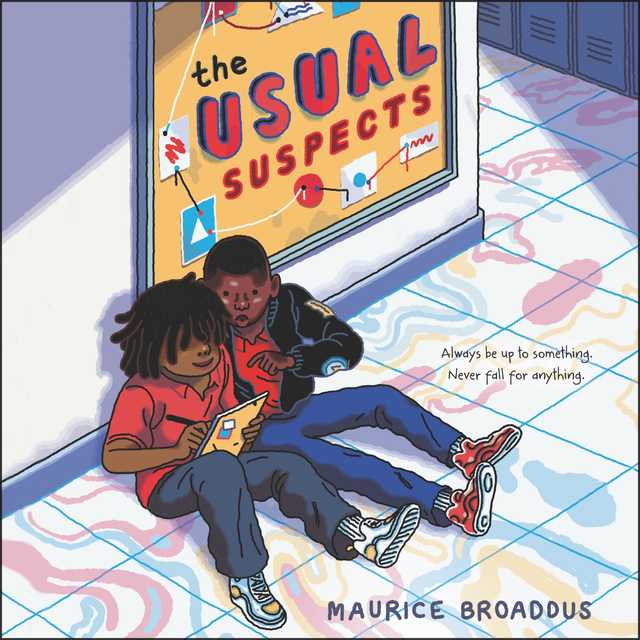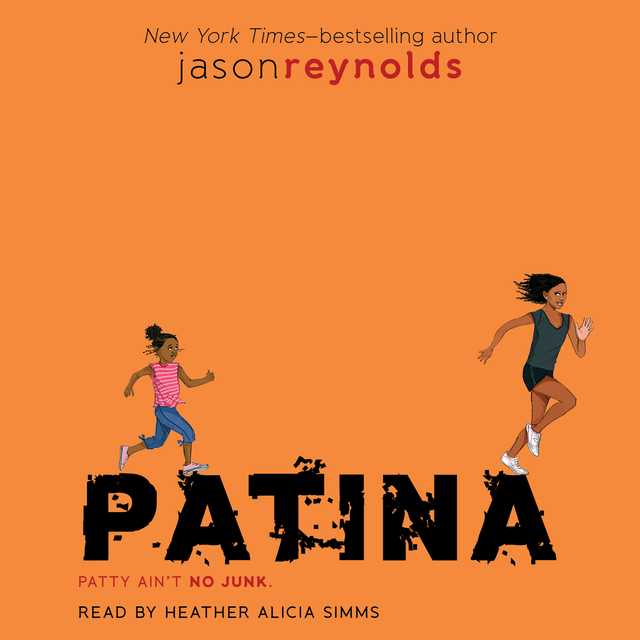The Usual Suspects Audiobook Summary
Fans of Jason Reynolds and Sharon M. Draper will love this oh-so-honest middle grade novel from writer and educator Maurice Broaddus.
Thelonius Mitchell is tired of being labeled. He’s in special ed, separated from the “normal” kids at school who don’t have any “issues.” That’s enough to make all the teachers and students look at him and his friends with a constant side-eye. (Although his disruptive antics and pranks have given him a rep too.)
When a gun is found at a neighborhood hangout, Thelonius and his pals become instant suspects. Thelonius may be guilty of pulling crazy stunts at school, but a criminal? T isn’t about to let that label stick.
Other Top Audiobooks
The Usual Suspects Audiobook Narrator
Michael Rishawn is the narrator of The Usual Suspects audiobook that was written by Maurice Broaddus
Maurice Broaddus, a community organizer and teacher, has written and edited short stories for a number of magazines as well as authoring several novels and novellas for adults. Learn more about him at www.mauricebroaddus.com.
About the Author(s) of The Usual Suspects
Maurice Broaddus is the author of The Usual Suspects
More From the Same
- Author : Maurice Broaddus
- Unfadeable
- The Voices of Martyrs
- Sweep of Stars
- Publisher : Katherine Tegen Books
- Sarah, Plain and Tall Collection
- Chronicles of Ancient Darkness #1: Wolf Brother
- Septimus Heap, Book One: Magyk
- Millions
- Araminta Spookie
The Usual Suspects Full Details
| Narrator | Michael Rishawn |
| Length | 4 hours 31 minutes |
| Author | Maurice Broaddus |
| Category | |
| Publisher | Katherine Tegen Books |
| Release date | March 16, 2021 |
| ISBN | 9780063078833 |
Subjects
The publisher of the The Usual Suspects is Katherine Tegen Books. includes the following subjects: The BISAC Subject Code is Juvenile Fiction, Prejudice & Racism, Social Issues
Additional info
The publisher of the The Usual Suspects is Katherine Tegen Books. The imprint is Katherine Tegen Books. It is supplied by Katherine Tegen Books. The ISBN-13 is 9780063078833.
Global Availability
This book is only available in the United States.
Goodreads Reviews
Betsy
October 04, 2019
Have you ever felt deep down bone mad at the universe because it withheld information from you? Information that is, by rights, yours to have? Because at this moment I’m in that very situation. I have here, in my hands, a book. I have read this book and found it marvelous. So I am in this funny state where I’m overwhelmed with love for this wonderful book on the one hand, and engulfed in a red hot fury that more people don’t know about it on the other. Some people discover a great book and they feel this sense of satisfaction, like they’ve discovered a gem or a treasure that is theirs and theirs alone. That’s not me. When I discover a great book my first thought is whether or not enough people are singing its praises. The Usual Suspects by Maurice Broaddus isn’t doing too terribly in that department so far. It’s received starred reviews, sure it has. But that’s not good enough, people. I want buzz. I want this book, so full of wit and intelligence, raw honesty and clever plotting, to be so well known that when I say "The Usual Suspects" to a room of librarians, their first thoughts involve neither Casablanca or Keyser Soze but this work by Maurice Broaddus. This all-too-real book.You know that special ed class where a school will toss all the kids they don’t really want to deal with? It’s a room of troublemakers. A room of scapegoats. A room ruled by Thelonius Mitchell. With a brain that’s always working, Thelonius sees through every person he comes across, working the angles, figuring out their weaknesses. Then, one day, he finds himself in a precarious position. A gun has been found on school grounds and by dint of being the usual suspects, the special ed kids are now under close scrutiny. Thelonius is used to the world thinking the worst of him, but this is a whole other level of injustice. It’s enough to get him investigating on his own. But as he begins questioning the different factions and kids of the school, it becomes clear that there are forces at work here that would like nothing better than for him to drop the whole case. And they’re willing to go to some pretty far lengths to make sure he knows exactly who’s in charge.In 2019, the year of this book’s publication, middle grade fiction has made a huge shift away from the fantasy novels and apocalyptic fiction of the Harry Potter and Hunger Games era. As any news channel will tell you, confrontations with reality yield far more drama than any dragon or bleak future could muster. In response, I’ve seen author after author attempt to render the times in which we live into palatable fiction for young readers. The best amongst them respect the kids. They know that children see far more than we ever give them credit for. The worst come off as preachy pablum, trying to instill lessons in great inelegant chunks. Many of these books tackle the topic of systematic oppression and racial inequities, both historical and ongoing. Some will talk about the police and others about protests and taking a stand. At first glance, The Usual Suspects wouldn’t strike you as one of these books. It’s fun, witty, and bouncy at times. Yet when you scratch even lightly at the surface, you see how Maurice Broaddus is doing something better than telling. He’s showing. Time and again, Thelonius outlines what it is like to live in a system where you’ve been labeled as a bad kid from the get-go. Constantly facing accusations and inequities, he’s shut down internally. Once in a while he’ll allow himself to have a dream for his future, but most of the time his head is full of the messages he’s been handed. His saving grace is that he can see outside himself a little. He says, “Stories are all about how they are read, not the teller’s intent. Sometimes the intent and the meaning match up, but sometimes they don’t. It’s easy to let a bad story get in you and define you. To let that version of how people see you soak in and take root, growing inside you until you find yourself becoming and acting out that story. It’s one reason I’m as suspicious of ‘teachers’ as they are of me.” And by putting you in T’s head, that oppression is more tangible than a million books that merely talk about oppression. Broaddus has just put it in terms you can understand with people a lot of kids see every day but don’t see, if you get my meaning. By giving voice to the voiceless, he’s redefining what it is to be a middle grade novel about systematic racism.They will tell you that folks that like Jason Reynolds or Sharon Draper would like this book. I have no idea why they say this. I mean, I know why, but Maurice Broaddus doesn’t write a thing like either of them. I saw someone online compare it to Maniac Magee which rubs me the wrong way entirely. You know what I thought of when I read this book? I thought of Harriet the Spy. Not the cutesy version people who haven’t read it in 20+ years remember, but the actual book. The one about the kid who’s smarter than most of the people around her, but self-sabotages herself every step of the way. When I read this book I also thought of the movie Brick, in which a kid conducts a thorough investigation, but must wrangle with various factions at school that want to stop his detective work cold. But the thing I thought about most is actually mentioned within the book itself. At one point Thelonius says, “Moms got me into reading Walter Mosley’s Easy Rawlins books.” Now I have lived a long time, but I’ve never seen a middle grade author make a pass at replicating Mosley for younger readers. What we seem to have here is something entirely new. Let’s talk compelling characters. Which is to say, let’s talk Thelonius himself. Written in the first person, he’s not a cipher but nor is he a Nick Carraway, commenting on people more interesting than himself all day long. One of the problems I often detect in first person narratives is that the main character just doesn’t have that interesting an interior life. Not a problem here. Thelonius just brims with insights, smart takes, and a jaded outlook on the adults around him. Broaddus continually peppers the book with off-handed comments that drill down deep into his main character’s core. Take when Thelonius is on the basketball court. When he has the ball, he’s a hog. And when he’s called out on this he says, “When the ball isn’t in my hands, when I’m not in control, I’m helpless. I can run around all I want, make screens, confuse the defense, but the reality is that whoever has the ball determines the action.” Look at the seeming effortlessness of that statement. There’s an elegance to the writing here. The author is trusting that the young reader will read more into that statement than what appears on the surface. That’s what I mean when I say he treats his readers with respect. Like they have brains or something. And Thelonius, while we’re talking about him, is himself limited. He’s interesting because you sometimes have a hard time rectifying his actions with his interior monologue. You like this kid pretty early on. Broaddus should probably give seminars on writing likeable flawed characters. At the same time you (and I think child readers would feel this as much as adult) are frustrated that he’s squandering his talents on various pranks. By the end of the book you get a glimmer of a sense that he might find a way to break out of his own self-imposed limitations, but clearly a sequel (hint hint hint hint) would be of use here. At one point he says, “I’m trying to do better, but I’m not sure what better looks like just yet. I think of it as using my powers for good against a bad guy. I may need to work on developing new powers, but until then, I’m going with what I know.”Of course, to get at the other characters in this book you have to go through Thelonius’s lens, and there’s a danger to that. If he’s too insightful then he starts sounding like an adult and you don’t trust your narrator’s voice. So the author has to walk this line between Thelonius’s deep-seated intelligence about his fellows, and the limitations of his own (admittedly magnificent) brain. Broaddus, once again, solves much of this with descriptions that say more than they say. Of Nehemiah it says, “Compared to him, I’m sculpted like an Olympian. He seems built like a collection of angry twigs.” Rodrigo Luis, “has the body of a third grader who had a diet of only leaves and water.” A particularly nasty character’s smile, “was ugly and jagged, like someone took a broken bottle and carved a slit where a mouth should be.” Tellingly, Thelonius is best at understanding people when they’re young. Adults throw him for more of a curve. He can’t separate their actions and intentions from the system they’ve signed on to and it makes him permanently skeptical of their actions. He loves his mom (who is a powerhouse of a woman that probably deserves a book of her own) but anyone in his school or associated with his school is immediately on watch in his eyes. We all have our preferences in the books we read. My preference is towards middle grade novels filled with sentences that pop off the page and dance around for a while. Honestly, you could not have constructed in a lab a book as jam packed with sentences more delicious than the ones found here. Some of my favorite examples:- When Thelonius’s mom gets off the phone with Nehemiah’s mom or grandma, “After a few minutes on the line with them, she stared at our phone like it was an alien tongue trying to lick her.”- Nehemiah’s grandma, “wears misery for makeup and chugs bitterness for vitamins.”- Of a fellow student, “his hair is a series of short dreds in need of tightening that stand nearly straight up so it looks like he’s wearing a fallen crown.”- “Nehemiah bounces his Teddy Grahams package off my chest. He hates them because he ‘never trusts anything that smiles all the time’.” - “That girl can’t find a maternal bone in a cemetery of mothers.” At one point in the book Thelonius talks about the difference between himself and the kids that are beloved by the teachers. The ones that obey all the rules without question. He says, “they’re always going to fit in. Nothing wrong with that. We just come at the world different because it comes at us different. It comes hard, we go hard. We don’t fit in with how the system wants to define us and sometimes we have to turn the system on itself for us to get by.” Even the adults that want to help are held back by this same system, and in many ways it’s the small changes Thelonius makes at the end, and not the solution to the mystery, that’s the real success. You want to know the real reason I compare this book to Harriet the Spy? Because it feels like the author is handing truths to the kids reading it, completely bypassing the adults of the world. It feels sneaky. I can see a kid gleaming truths from these pages that they have NEVER encountered anywhere, with the possible exception of their own brains. I can see adults becoming uncomfortable with just how much honesty is on display here. It gives away the game, this book does. It’s always a good idea to sometimes read a book that’s smarter than you are, starring a kid that’s smarter than the world around him. You know why I haven’t heard more people talking about this book? Because nobody knows how to sell it. Well, sorry folks, but the secret is out now. It’s one of the best books I’ve ever read for kids, and maybe the best school rated children’s novel I’ve encountered period. This, right here, is the book of our times.For ages 9-12.
caitlin
February 12, 2019
Review copy courtesy of Edelweiss.Cannot wait to buy this for my library, and I think it is a must buy for urban classrooms and libraries in middle school settings. This is a noir tale told by the boy who is always getting in trouble - so much, in fact, he spends almost his entire day in his pull-out special education classroom. When someone brings a gun to school and Thelonius and his friends in their class are blamed, he decides to investigate on his own and find the true culprit. The story is funny, creative, and interesting, and feels realistically fresh.
Robert
May 22, 2019
This book is a middle grade crime thriller that is always engaging and never pedantic, beginning with the crime itself. This is isn't the case of the missing school trophy or a cookie caper. Broaddus is writing about some real stuff: a gun has been found in a park near school where our heroes hang out with other kids and everyone's a suspect... except that mostly the teachers suspect Thelonius Mitchell and his friends because they're, wait for it, the usual suspects. To clear their name, Thelonius and his friends must discover the true culprit (it's probably Keyser Soze).Like the best Elmore Leonard fiction, which the author makes clear in his notes he's emulating, The Usual Suspects is all about a classic crime set up populated by compelling characters, beginning with our main character, Thelonius Mitchell:So I'm back in the principal's office once again. Due to "my escalating antics" I'm here a lot. Some teachers float the idea that I have oppositional defiant disorder (sometimes I think they just say that about kids who say no to whenever adults tell them to do something, in which case, I have a severe case of it, as does every middle schooler I know). Some keep trying to say that I have bipolar disorder (because my shnanigans are so over-the-top). None of them is a doctor and just wants to sweep me and my issues under the rug. Moms scheduled an exam for me to get tested, but with our insurance, it's over a month out. Until then, I have to spend the rest of the quarter in the Special Ed room.Thelonius is clever and insightful. He's good at understanding relationship dynamics and how to manipulate them, yet he's far from a criminal mastermind:Whenever I try to polish my voice like Pierce, I always sound like a con artist on the prowl. Adults grow suspicious and know I am up to something, but they have no proof and need to see whatever I am up to play out. I might as well be a thief sending a note daring the cops to stop me from robbing a joint.Thelonius is our perspective character, naturally, as this is a story told in the first person present tense, but my favorite character is his friend, Nehemiah Caldwell. Nehemiah also has some issues, including a whole lot of pent up anger, but he made me smile in most every scene he's in. Everyone agrees that Nehemiah couldn't have been the one to leave the gun in the park because if he'd had a gun, he'd have waved it at everyone. Also, Nehemiah's distrust of Teddy Grahams might be my favorite character detail in the book:Nehemiah bounces his Teddy Grahams package off my chest. He hates them because he "never trusts anything that smiles all the time."There are a lot of excellent characters populating this story. We're not going to go through each of them one by one, but I would mention just a few more. We'll talk about Marcel in a moment, but first I want to talk about the teachers in this book. Thelonius knows better than to trust any of them, even Mr. Blackmon, who appears to be the most trustworthy. After all, T tells us, "Lying to adults is how we breathe."But Thelonius does know how to work his teachers: Teachers are like people: if you annoy them, by the time you need something they'll automatically say no just to spite you. Do what they want or make their job easier, they are quick to reward you.The teachers in this story aren't monolithic villains. In fact, Broaddus goes out of his way to show that in some ways, they're as trapped by the social system of control put in place as the boys are. But they do demonstrate villainous qualities on occasion:Mrs. Horner rarely comes at things directly. She keeps things vague, saying that she doesn't want to limit our creativity. It's more likely that she wants us to accidentally tell on ourselves.Mrs. Fitzerald has a swagger to her. A bit of a gangster vibe. She wanders the halls with a beaming smile, but she has a resting teacher face with her eyes narrow like unflinching lasers.The teachers range from honestly trying to make a positive impact in their students' lives to completely disengaged (one of them is on her phone checking Facebook all day) to outright hostile toward the students and our heroes. Broaddus' observations about teachers are probably based on his years of experience working in education, and that honest look at teacher student dynamics is one of the strongest aspects of The Usual Suspects.There's one other character readers are going to love and no review would be complete without mentioning her:Her dad, a black dude, is a scientist who often visits her class to talk about his work. Her mom, a white lady, is the president of the PTA who also bakes a mean batch of brownies come school fund-raising season. If Marcel came from money, she never acted like it. Marcel always received straight A's. By all reports, she was the best-behaved kid in the class. But I know better. The quiet ones are the ones everyone really has to watch out for. You see, an obvious stickup thug might get a wallet or two. Put them in bankers' suits and they were robbing folks for millions on Wall Street.Marcel was strictly Wall Street.Marcel is a cool customer. I can't tell you a whole lot about her without spoiling some specific plot details, but readers are going to find her fascinating. And more interesting to me at this moment is the first two lines of her description, which are about her parents. To the best of my recollection, Marcel's mom is the first "white lady" in the story.Not every character's race is specified, but most of the character's who's coloring is mentioned are described as having skin "the shade of sunbaked cinnamon," or "the color of rich sepia," or "the complexion of milk with a dab of butter in it." The effect of this is that "not white" becomes the readers' default assumption about which race each character is, a refreshing change of pace, especially for a middle grade novel coming out of Indiana (former home of the head of the Klan not nearly long enough ago).The Usual Suspects isn't about race, exactly, but it's not not about race. Just like it's not strictly about kids with special needs, but it's not not about them: Moms explained what she has, something about being on the autism spectrum. I hear so many labels placed on me and my friends, I tune them out. On its surface, The Usual Suspects is a fun middle grade crime novel with memorable characters and a quality mystery to be solved. Esteemed Readers looking for a good story well told will absolutely find it here and will join me in hoping Maurice Broaddus publishes more middle grade novels right away. We need as many of them as we can get.But The Usual Suspects is really about multiple intersecting social dynamics and how they can trap and label all of us, not just the kids perceived as troublemakers, but also their teachers, their parents, other children in the neighborhood, and so on. Because all of us have assumptions made about us based on the broad categories society has placed us in. All of us are suspect.Do yourself a favor, Esteemed Reader, and get yourself a copy of The Usual Suspects. It's themes are universal and you will be captivated by Broaddus' style and structure and his ability to present authentic characters in relatable situations.More, if there's a problem child in you life, they need to read this book. I wish this book had been around when I was an adolescent and automatically suspected of wrongdoing by some of my teachers (I wasn't always a fine, upstanding Ninja). I don't know that it would've necessarily changed much for me (young me was pretty committed to being troublesome), but sometimes it's enough to know that someone else understands the experience and can relate. As always, I'll leave you with some of my favorite passages from The Usual Suspects:I catch myself as my hand moves to my chest to protest my innocence. That kind of theatricality would be insulting to both of us.That girl can't find a maternal bone in a cemetery of mothers."I'm better than his momma. I'm actually here." Moms lets that line sit in everyone's ear for a minute, like she wants it to travel the neighborhood, before she continues. Some still go on about the hottest Pokemon cards. They are so sixth grade.Twon knocks over another chair like Superman casually tossing a tank.One kid lingers by the pencil sharpener opposite from us. Marquees Neal. "Kutter" to (what few people he called) his friends. His hair is a crown of twists, nesting baby snakes poised to strike. His eyes seem perpetually narrowed, like jagged scars.
Becky
May 07, 2020
Three words that describe this book: conversational tone, character centered, thought provokingOne of my reading resolutions this year was to read more Middle Grade novels. I sought this one out specifically because I have read an enjoyed Broaddus' adult novels, but those were speculative. Broaddus is a teacher and this book is set in middle school.What I enjoyed about this novel was that it looked at the issue of how the kids in special education are treated but through their eyes and with a tone that didn't try to beat home how unfair it all is. They also aren't treated in a stereotypical bad way. This realities of this school and the special education program are the frame. He creates it realistically and honestly and then lays a compelling and intriguing mystery over it all.This is a solid mystery for any age reader. The characters are great, the issues very topical [a gun being found near the school] and the resolution satisfying. It is very honest and also hilarious. Broaddus is writing to the kids because he knows them from his years of teaching. He doesn't need adults to interact with this book, understand this book, or approve of this book and yet, this is all why I think more adults need to read this book. It does not talk down to anyone.The characters are very realistic as kids. No one is "too" anything: too precocious, too bad, too good, to class clowny. I volunteer at a school library and these were regular kids. Kids who read this book will see their friends, classmates, and selves in the story. There are kids of all races and abilities here and they are taken for when they are by each other. Also the relationships are excellent. Positive family relationships, great friendships, appropriate teacher-student closeness, and believable coming of age/growth.This is a story for mystery lovers. It flows easily with a conversational tone. Readers will come to adore the characters and root for them, while also acknowledging their missteps. You will laugh a lot, but also feel how hard it is to be a kid these days.Readalikes:As I said in my review of Jason Reynolds' LOOK BOTH WAYS [https://www.goodreads.com/review/show...], this is a story about regular kids today, one that more adults would read to understand "kids these days" better. Jason Reynolds generally writes for a slightly older audience but LOOK BOTH WAYS and AS BRAVE AS YOU are in the same age range and treat being a kid similarly.I have seen a few people mention this in reviews but Thelonius is very similar to Harriet the Spy, but he's the black 21st century version of that classic MG, mystery heroine.
Kristen
March 12, 2021
Normally this kind of middle grade read would be an easy 3-star read. But this is MY SCHOOL. I'm not kidding--we have this same program for kids who struggle with behaviors (minus the Scream Room, thank goodness). We have a Mrs. Horner, unfortunately, who teaches in that program. We have a Mr. Blackmon, thankfully, who loves those kids and does whatever he can to reach them.And we have kids like Thelonius and Nehemiah--kids who are bright and thoughtful, but whose behaviors sometimes lead the rest of us to discount them and make assumptions (me included). I wish every teacher in my building would read this book. It's not going to solve all of our problems (obviously), but it's an excellent opportunity to reflect.
Justice
January 20, 2023
I've been on a good run of middle grade recently!I heard about this because the author was a guest host on Writing Exuses a couple times and talked about this book (as well as a couple others that sounded pretty cool as well).I really, really liked this one. I really felt for all the kids AND (some of) the adults. It also did SUCH a great job of playing with more noir tropes like the gangster, the informants, etc... inside a middle school. I also really liked how it portrayed Thelonius's frustration at being labeled 'a usual suspect' while acknowledging that his actions set him up for that, and how people's expectations of you shape your behavior. Seeing both his mom and Mr. Blackwell trying to help the kids in their own way was pretty neat (and despite Thelonius's feelings, I wouldn't mind of those two flirted a bit).Overall, I felt it did such a good job at balancing "Yes these people are acting this way for a reason and the reasons need to be addressed" with "These people need to take responsibility for their own actions". I wasn't quite sure about the ending, though. Minor spoilers ahead, but ill keep it vague. I get the feelings Thelonius has that the system isn't perfect, so he can't really trust the good adults in the system. And revealing who actually brought the gun probably wouldn't solve anything, because the kid didn't need to be shipped off in the back of a cop car. But 1, the other kid didn't need that punishment either (especially not for a crime he didn't commit), and 2, something needed to be done about the kid who DID choose to bring a gun to school. That may be beyond the scope of this book, but it did feel a bit glossed over at the end.
Kendall
September 21, 2019
I really loved this book! With a very realistic representation of two EBD boys in a self-contained Special Ed classroom, this book help to fill a major gap in kid lit. We need books the “bad kids” can relate to just like any other kid. I already have a few in mind that I’d like to hand this book to. My only hesitation with this book is that it involves a gun being brought to school. That worries me, but is a real thing that happens! And ultimately the protagonist grows from his small involvement in the very serious scandal.
Abby
July 08, 2019
Actually made me pretty uncomfortable as an adult, but it's a good thing to be reminded of the resilience, smarts and heart of middle schoolers who are facing such difficult pressures from their parents, communities, teachers, peers and their own physical and emotional needs. An actual 11 year old I lent it to for several chapters also pronounced it "pretty good"
Thomas
March 31, 2020
I didn't know at first whether I liked the book or not. I have a hard time sympathizing with troublemakers. But by the end of the book I loved Thelonius and Nehemia. In general, the author did an excellent job giving his characters personality, even the less significant ones. I do wish it ended differently. But oh, well.
kelly
June 10, 2019
Thelonius Caldwell is very much like many of the boys I taught in my ten years as a middle school teacher: bright, mischievous, and labeled as "special ed." Despite his label he is very keen in his perceptions of people and aware of the reality that he is being 'warehoused' (i.e., placed in a self contained classroom with similar students and given sleep-inducing lessons until he either drops out or is removed via expulsion). Because the school and his teachers have low expectations of him, Thelonius and his friend Nehemiah pass the time by playing pranks on the staff, causing chaos between students, and just plain acting silly. One day, a gun is found in a park near their school. Because Thelonius and Nehemiah have a reputation for bad behavior, the principal rounds them up and blames them for the incident. Knowing that he did nothing wrong, Thelonius begins to search for the culprit, careful not to be a snitch. This story traces the route along his journey for answers, playing homage to the 1995 film "The Usual Suspects." There's even a Keyser Soze kinda figure, which is pretty brilliant for a kid's book. I definitely recommend this book. Sure, it's a readable children's book but there's a sad subtext: the reality that far too many poor children of color are placed in "special ed" classes and, once there, nobody is supporting or listening to them. Research shows that these are the kids who are most likely to drop out of school entirely and end up in the criminal justice system, or just to have poor outcomes in life in general. It's a very real depiction of their lives.4 stars.
Gretchen
July 13, 2019
The characters in this book give you a perspective of students you don't usually read about in books, the students who a labeled "trouble-makers" or "those kids." In their school, they are part of a self-contained classroom for students who have behavior difficulties (like the Oasis program we have in our school.) I'm having trouble lately with all of the school's emphasis on social-emotional needs of the kids and how because this hasn't been strong in their lives we can't expect them to understand proper behavior because their brain isn't processing it the same. I even took a class last summer called Help for Billy with scientific studies to back up the ideas, but I still struggle with the reasoning for many reasons. I found myself getting angry with the characters in this book and not fully believing their explanations or perspectives. I suppose the author achieved his mission with me too because this book has got me thinking and feeling even if it isn't on the side of the boys. I chose to read this book to try to understand the behavior more and it gave me more information, but I struggle with my feelings about what I learned and what I feel and how it fits into my life and the life of other students. Even as I write this, and I read the book two weeks ago, I still feel "my dander being raised" as I write about it. Interesting.
Sarah
March 16, 2022
Middle grade fiction is not usually my jam, but let me tell you about this book. It's SO GOOD. The protagonist, Thelonious, has this voice that is both authentic enough for child readers and sophisticated enough that I still enjoyed his narration. And unlike in other middle grade books, Thelonious doesn't just have an adventure--he actually grows and matures because of the events in the story. It's a noir novel, but it's also funny in some places and full of heart in others. And if you teach middle school in the inner city like I do, you'll delight in seeing kids just like your students on the page. And if you're looking for a book your kids will like, it's a good bet they'll relate to this one!
Deana
March 01, 2021
This is one of those books where as a teacher, the main character Thelonius, called T, frustrates me, but then I eventually remember that this book isn't written for me as an adult. I loved reading this book from the perspective of students who feel isolated and are treated differently because they are in the Special Ed room. I loved T's relationship with his mother and with his peers, particularly his friend Nehemiah. I've seen kids like him and felt like his voice was authentic. And even though I may not have been able to understand all of his decisions, I'm glad he was able to find a way to speak for the voiceless. There are definitely some reluctant readers that I think could be won over with this book.
Frequently asked questions
Listening to audiobooks not only easy, it is also very convenient. You can listen to audiobooks on almost every device. From your laptop to your smart phone or even a smart speaker like Apple HomePod or even Alexa. Here’s how you can get started listening to audiobooks.
- 1. Download your favorite audiobook app such as Speechify.
- 2. Sign up for an account.
- 3. Browse the library for the best audiobooks and select the first one for free
- 4. Download the audiobook file to your device
- 5. Open the Speechify audiobook app and select the audiobook you want to listen to.
- 6. Adjust the playback speed and other settings to your preference.
- 7. Press play and enjoy!
While you can listen to the bestsellers on almost any device, and preferences may vary, generally smart phones are offer the most convenience factor. You could be working out, grocery shopping, or even watching your dog in the dog park on a Saturday morning.
However, most audiobook apps work across multiple devices so you can pick up that riveting new Stephen King book you started at the dog park, back on your laptop when you get back home.
Speechify is one of the best apps for audiobooks. The pricing structure is the most competitive in the market and the app is easy to use. It features the best sellers and award winning authors. Listen to your favorite books or discover new ones and listen to real voice actors read to you. Getting started is easy, the first book is free.
Research showcasing the brain health benefits of reading on a regular basis is wide-ranging and undeniable. However, research comparing the benefits of reading vs listening is much more sparse. According to professor of psychology and author Dr. Kristen Willeumier, though, there is good reason to believe that the reading experience provided by audiobooks offers many of the same brain benefits as reading a physical book.
Audiobooks are recordings of books that are read aloud by a professional voice actor. The recordings are typically available for purchase and download in digital formats such as MP3, WMA, or AAC. They can also be streamed from online services like Speechify, Audible, AppleBooks, or Spotify.
You simply download the app onto your smart phone, create your account, and in Speechify, you can choose your first book, from our vast library of best-sellers and classics, to read for free.
Audiobooks, like real books can add up over time. Here’s where you can listen to audiobooks for free. Speechify let’s you read your first best seller for free. Apart from that, we have a vast selection of free audiobooks that you can enjoy. Get the same rich experience no matter if the book was free or not.
It depends. Yes, there are free audiobooks and paid audiobooks. Speechify offers a blend of both!
It varies. The easiest way depends on a few things. The app and service you use, which device, and platform. Speechify is the easiest way to listen to audiobooks. Downloading the app is quick. It is not a large app and does not eat up space on your iPhone or Android device.
Listening to audiobooks on your smart phone, with Speechify, is the easiest way to listen to audiobooks.






























